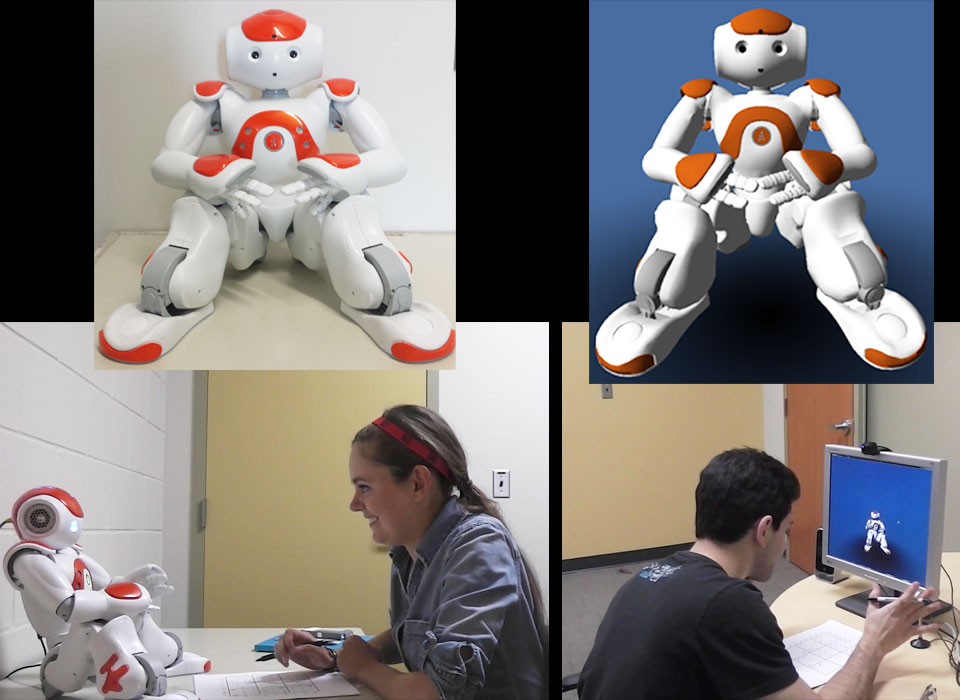
Robohub.org
Would you feel sorry for a simulated robot? Study shows people empathize more with the real thing
by Stela Seo, Denise Geiskkovitch, Masayuki Nakane, Corey King and Jim Young
 In the future, robots will be in our daily lives: homes, schools, offices, factories, even restaurants. The field of social robotics looks at how these robots can interact with people socially, just like other people do. This makes robots easy to understand and more comfortable to be around. Cute cuddly robots like Paro even help sick people feel better and reduce loneliness by creating empathy. But as anyone who has worked them knows, robots are very hard to program: they fall over, their vision is terrible, and they are very easy to break. They are also very expensive: $10,000USD is a reasonably cheap robot. Because of these challenges, researchers often use robotic simulations in software instead of real robots.
In the future, robots will be in our daily lives: homes, schools, offices, factories, even restaurants. The field of social robotics looks at how these robots can interact with people socially, just like other people do. This makes robots easy to understand and more comfortable to be around. Cute cuddly robots like Paro even help sick people feel better and reduce loneliness by creating empathy. But as anyone who has worked them knows, robots are very hard to program: they fall over, their vision is terrible, and they are very easy to break. They are also very expensive: $10,000USD is a reasonably cheap robot. Because of these challenges, researchers often use robotic simulations in software instead of real robots.
Using computer graphics and motion simulations, on-screen robots can be quite convincing and similar to the real thing, and researchers sometimes use these to conduct studies about how people interact with these robots. Clearly, simulations have limitations when compared to the real thing; for one, people cannot touch simulated robots. But what about for simpler cases where people just converse with the robot or work together on a mental task? Do people interact with these simulated robots the same as they would a real robot? Would people feel empathy for a simulated robot in the same way as they do for real robots?
We conducted a study to investigate this question, according to the following scenario:
- A person gets to know an intelligent robot’s personality while collaboratively playing Sudoku
- The robot gets a virus and acts increasingly strange
- The robot expresses fear of being reset and losing its memory
- The robot is erased by the researcher and loses its memory (Poor thing!), and re-introduces itself with a new voice.
This is scenario similar to a common movie cliché, where a protagonist has a friend who is harmed by an unpopular third party (in our case, the researcher). Based on background work in this area, we expected that people would feel sorry for the robot, feel empathy, similar to how they would for an animal or a pet. We validated our study design by comparing it to a case where the robot does not get a virus or get reset, and found that indeed people empathized more with the unfortunate robot that loses its memory.
We did this study twice: once with a real robot, and once with an identical simulated robot: same look, same voice, same actions, and same conversation. We found that people rated their empathy about 10% higher for the real robot than for the simulated one. So, if you are investigating social interactions with your robot, be wary of using simulations – the interaction may not quite be the same as the real thing.
Like any interesting result, our work raises more questions than it answers. Why does this difference exist? Is it as simple as people knowing the difference between real and fake things? Maybe we are used to seeing bad things happen in virtual worlds? Would this difference happen for positive empathy as well? Will this hold for other kinds of robots? What other social interactions are different with simulated robots? Moving forward, our team is continuing to look into these questions!
One final point – looking back, the really hard part of this work was to make a study design that is convincing, believable by the participants, and actually makes people feel sorry for the robot. This was much harder than we expected, and we ended up collaborating with a local artist company, ZenFri Inc.
So – which would you feel more sorry for: a simulated robot, or a real one? If you want to learn more about our process, or any of our results, please check out our paper or visit our project homepage.
Stela H. Seo, Denise Geiskkovitch, Masayuki Nakane, Corey King, James E. Young. “Poor Thing! Would You Feel Sorry for a Simulated Robot? A comparison of empathy toward a physical and a simulated robot,” In proceedings of the 10th ACM/IEEE international conference on Human-Robot Interaction, HRI’2015, Portland, Oregon, USA.
If you liked this article, you may also be interested in:
- Driven by care needs, will it be the booming senior population that spurs wider acceptance of robots?
- Natural language: The de-facto interface convention for social robotics
- Should a care robot bring an alcoholic a drink? It depends on who owns the robot
- Evaluating the effectiveness of robot behaviors in human-robot interactions
See all the latest robotics news on Robohub, or sign up for our weekly newsletter.
tags: c-Research-Innovation, human-robot interaction, NAO, Simulation












